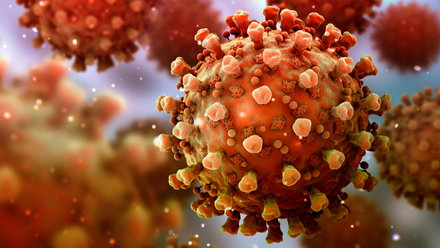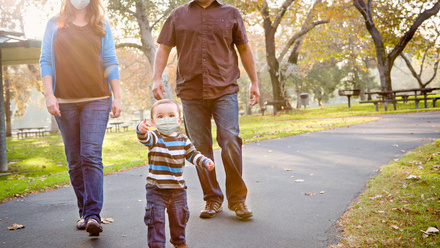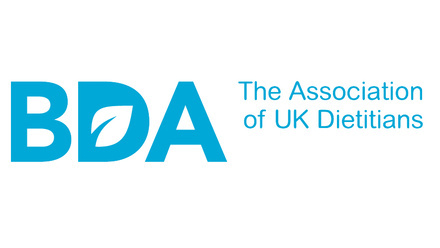Infection control guidance and Personal Protective Equipment (PPE) provision are out of date and are placing health and care staff at risk, an alliance of health professional bodies, Royal Colleges and trade unions said today.
The concern comes as news of the spread of new variants of concern, especially an Indian variant in parts of the North West and London, raise the prospect of a further wave of cases.
The alliance members, which include the Royal College of Nursing, AGP Alliance and Fresh Air NHS, wrote publicly to Prime Minister Boris Johnson in February 2021 to express their concerns. They say the response they received from Number 10 failed to recognise the growing evidence that the virus can be spread in tiny particles known as aerosols.
New statements from the government’s own Scientific Advisory Group for Emergencies (SAGE), the World Health Organisation (WHO) and the US Government Centre for Disease Control all recognise the role of airborne transmission, yet UK guidance only recommends the use of higher grade FFP3 respiratory masks (which can block aerosols) for a limited range of procedures. Conservative Health & Social Care Select Committee Chair, Jeremy Hunt MP, has also publicly acknowledged that COVID-19 is airborne.
It is now well established that spread of COVID-19 will be much worse in crowded areas, indoor spaces (especially with poor ventilation) or places with large numbers of infected individuals. This makes hospitals and other health and care settings particularly high risk, and also applies to indoor spaces outside of a hospital or care home setting – such as in the back of an ambulance or when caring for patients in crowded or poorly ventilated homes.
Change is needed urgently to help regain the trust of an exhausted health and care workforce, they argue, and government cannot rely solely on the vaccine roll-out to protect health and care staff.
Rose Gallagher MBE, Professional Lead for Infection Prevention and Control at the Royal College of Nursing, who coordinated the letter to the Prime Minister, said “The response from the Prime Minister’s office is very disappointing. The policy it outlines is significantly out of date, and the UK is now lagging significantly behind other countries in our approach to PPE and infection control.
“In other countries they have already been using higher-grade FFP3 masks for months and their death rates are accordingly much lower than the UK, where hundreds of HCP have died and tens of thousands have been off work at any one time.”
In the same week that the Indian variant of the coronavirus has been identified as “of concern”, Gallagher warned against sole reliance on the vaccination programme; “Despite current success in reducing infections in the general population, not all staff have been vaccinated and no vaccine is 100% effective. The threat of new variants is very real and a third wave is predicted, so we must not assume the pandemic is behind us.”
Dr Barry Jones, Chair of the AGP Alliance, said; “We have long argued that COVID-19 was being spread through the air, and that as a result we need a higher standard of PPE irrespective of whether delivering an Aerosol Generating Procedure (AGP) or not. It is simply currently not possible for hospitals to adequately ventilate all their indoor spaces, so appropriate masks are vital. Current guidance recommends only surgical masks for most health and care staff, but these are not designed to block aerosols and are clearly not sufficient.”
Gillian Higgins, a surgeon and co-founder of charity MedSupplyDriveUK said “Many UK health and social care workers are still only provided surgical masks when providing patient care in very close contact with coughing COVID-19 positive patients, in small unventilated spaces.
“Patients are appalled that we don’t have better protection, and 83% of staff surveyed said they don’t feel safe at work. We all know that surgical masks do not protect the wearer from airborne transmission of COVID-19.
“Reusable FFP3 respirators are a feasible solution for providing all UK frontline workers with access to the FFP3 protection they need; they provide superior comfort and fit, are affordable, environmentally friendly and sustainable. Multiple manufacturers have worked with us to tailor respirators for patient care settings and are keen to produce reusable FFP3 respirators in the UK; improving supply chains, whilst creating UK jobs.”
Dr Alastair McKinlay, President of the British Society of Gastroenterology said; “The BSG welcomes the huge progress that the UK Government and the Devolved Administrations in Scotland, Wales and Northern Ireland have made in taking forward the COVID-19 vaccination program, which will help to protect health and care workers. The threat of new viral variants and the possibility of further waves of infection in the future means, however, that Health and Care Workers must continue to be protected, both for their own health and safety, but also to prevent them from inadvertently exposing their patients, families and colleagues, to infection.
“The current period, where rates of COVID infection are falling, should be used by the governments of all the UK Nations to secure supplies of PPE for Health and Care Workers, and to ensure that their policies on the prevention of infection reflect the latest scientific findings. During the early stages of the pandemic, Health and Care Workers stepped up to the mark and put their patients first. Now, however, they should reasonably expect to be kept safe during procedures which expose the operator to aerosol transmission, by policies and equipment that meet the best standards, and are not simply ‘adequate’.”
Notes to editor
- The British Dietetic Association is a member of the AGP Alliance. Read more about our work to secure a greater standard of PPE for our members here.
- Health & Social Care Select Committee chair Jeremy Hunt was quoted in yesterday’s BBC South East Today programme as saying that COVID-19 is “airborne”. He also said: “We didn’t fully understand the extent of the asymptomatic transmission early on.” He added: “We think 20% to 40% of the people who died from COVID across the country picked up the infection in their hospital,” but thought that people who go into hospital expect to be safe. Even some of the hospitals that followed all the guidelines found that patients were picking up COVID inside hospitals. And, the big lesson to be learned is we were really hot on making people wear PPE in intensive care units and in the COVID wards, but we didn’t take action early enough to make sure there was social distancing and other precautions in the non-COVID wards.”





